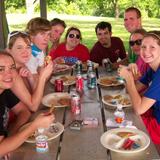- The mission of Lon Morris College is to offer a quality liberal arts education within a Christian community that allows the whole person to develop and mature.
School Highlights
Lon Morris College served 552 students (96% of students were full-time).
Minority enrollment was 70% of the student body (majority Black), which was less than the state average of 74%.
School Overview
Lon Morris College
(TX) Community College Avg.
Institution Control
Public
Public
Year Founded
1854
Total Faculty
102 staff
262 staff
Student Body
Total Enrollment
552 students
4,931 students
Student-Teacher Ratio
n/a
23:1
# Full-Time Students
529 students
909 students
# Part-Time Students
23 students
4,022 students
# Enrollment Undergraduate
n/a
403 students
# Full-Time Undergraduate Students
552 students
890 students
# Full-Time Graduate Students
n/a
40 students
# Part-Time Undergraduate Students
23 students
4,166 students
# Part-Time Graduate Students
n/a
47 students
Total Dormitory Capacity
n/a
252 students
% American Indian/Alaskan
1%
n/a
% Asian
n/a
6%
% Hispanic
9%
46%
% Black
46%
13%
% White
30%
26%
% Two or more races
n/a
3%
% Non Resident races
2%
2%
% Unknown races
12%
4%
Diversity Score
0.68
0.70
College Completion Rate (Students who graduate in less than 4 years)
30%
18%
College Completion Rate (Students who graduate in 4 years or more than 4 years)
n/a
34%
Average Graduate Earnings (10 Years)
$33,300
$34,600
Tuition and Acceptance Rate
% Students Receiving Some Financial Aid
97%
77%
Median Debt for Graduates
$11,000
$9,291
Median Debt for Dropouts
$5,500
$4,497
Acceptance Rate
66%
75%
Source: 2012 (or latest year available) Integrated Postsecondary Education Data System (IPEDS)
School Notes
- School Mascot: Binturong
- Lon Morris College is a church-related, two-year college of the arts and sciences with a core curriculum emphasizing the liberal arts. As a two-year college, Lon Morris College offers two years of higher education, foundational for advanced degrees, for those going on to more extended general education or to specialized and professional study. Lon Morris College was founded in 1854 as the Danville Academy near Kilgore, Texas. In 1875, the school became the property of the East Texas Conference of the Methodist Episcopal Church South, and changed its name to Alexander Collegiate Institute in honor of its president and outstanding early Texas educator, the Reverend Isaac Alexander. The charter was obtained in 1886, and in 1894 the school was moved to its present location in Jacksonville, Texas. The name was changed once more, in 1924, to Lon Morris College by approval of the Texas Annual Conference after R.A. “Lon” Morris of Pittsburg, Texas gave his estate to the school. Lon Morris organized the first Phi Theta Kappa in Texas, which was begun in 1929. Phi Theta Kappa is the national scholastic society for two-year colleges. Lon Morris is the only two-year United Methodist college west of the Mississippi River, and it is the only surviving pre-Civil War school in East Texas. The college offers an Associate of Arts (AA) degree, an Associate of Science (AS) degree, or an Associate of Fine Arts (AFA) degree. Lon Morris College is accredited by the Commission on Colleges of Southern Association of Colleges and Schools and the University Senate of the United Methodist Church.
Frequently Asked Questions
What is the acceptance rate of Lon Morris College?
The acceptance rate of Lon Morris College is 66%, which is lower than the state average of 75%.
Recent Articles

Community College Policies and Financial Aid Guide 2026
A 2026 guide to community college policies and financial aid, including FAFSA updates, state aid, tuition rules, and smart planning tips.

Get Better Grades in Community College by Being Social (2026 Update)
Learn how being social in community college boosts grades, retention, and career success. Updated 2026 strategies for academic achievement.

Navigating Community College as an Adult Learner in 2026
A practical 2026 guide for adults returning to community college, covering admissions, financial aid, career planning, and flexible learning options.







